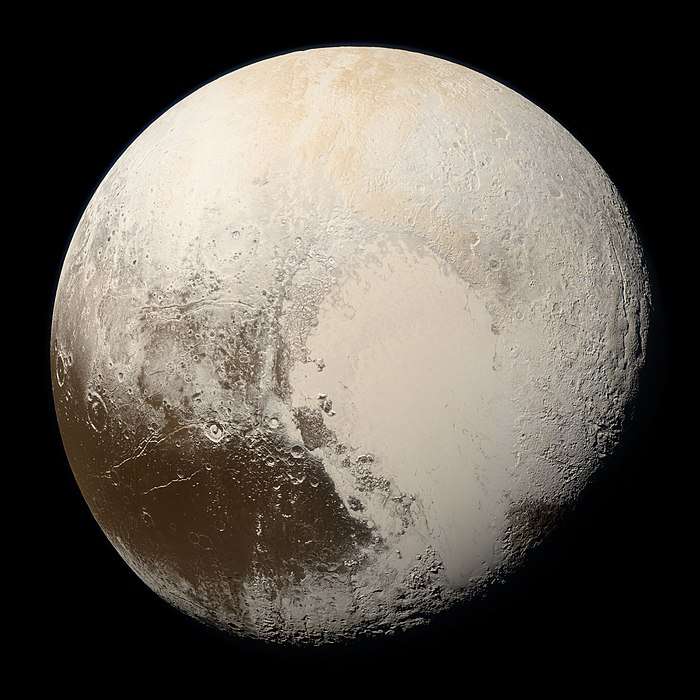(523671) 2013 FZ27
(523671) 2013 FZ27, provisional designation 2013 FZ27, is a trans-Neptunian object and likely dwarf planet, located in the Kuiper belt in the outermost region of the Solar System, approximately 570 kilometers (350 miles) in diameter. It was discovered on 16 March 2013, by American astronomers Scott Sheppard and Chad Trujillo at the CTIO in Chile. Numbered in 2018, this minor planet has not been named.
| Discovery[1] | |
|---|---|
| Discovered by | Scott Sheppard Chad Trujillo |
| Discovery site | Cerro Tololo (807) |
| Discovery date | 16 March 2013 |
| Designations | |
| (523671) 2013 FZ27 | |
| 2013 FZ27 | |
| TNO [2] · distant [3] other TNO [4] · p-DP [5] | |
| Orbital characteristics [2] | |
| Epoch 27 April 2019 (JD 2458600.5) | |
| Uncertainty parameter 1 | |
| Observation arc | 17.07 yr (6,234 d) |
| Earliest precovery date | 20 February 2001 |
| Aphelion | 58.713 AU |
| Perihelion | 37.574 AU |
| 48.143 AU | |
| Eccentricity | 0.2196 |
| 334.05 yr (122,013 d) | |
| 282.75° | |
| 0° 0m 10.8s / day | |
| Inclination | 14.059° |
| 285.22° | |
| 341.93° | |
| Physical characteristics | |
Mean diameter | 561 km (est.)[5] 584 km[4] 335–748 km (calculated, using H=4.5 and albedo = 0.25 ~ 0.05)</size>[6] |
| 0.09 (est.)[4][5] | |
| 4.4[2] 4.6[5] | |
Orbit and classification
2013 FZ27 is a trans-Neptunian object (TNO),[7] located beyond the orbit of Neptune (30.1 AU). The Johnston's archive classifies it as an unspecific "other TNO", meaning that the minor planet is neither a resonant nor a classical TNO.[4] Astronomer Michael Brown considers 2013 FZ27 to be a "likely" dwarf-planet candidate, a moderate-probability third place out of his five-level ranking system, as its estimated diameter is a little under 600 kilometers.[5] Taking the mean of the two magnitudes, and using the standard 0.25 ~ 0.05 range for minor planets of unknown albedo, a wider 335 to 748 km spread of possibilities can be calculated for the actual diameter.[6]
2013 FZ27 orbits the Sun at a distance of 37.6–58.7 AU once every 334 years and 1 month (122,013 days; semi-major axis of 48.14 AU). Its orbit has an eccentricity of 0.22 and an inclination of 14° with respect to the ecliptic.[2]
The body's observation arc begins with a precovery taken by the Sloan Digital Sky Survey on 20 February 2001, over 10 years prior to its official discovery observation at Cerro Tololo.[3] The object was first announced on 2 April 2014, when American astronomers Scott Sheppard and Chad Trujillo at the CTIO in Chile published their observations in a Minor Planet Electronic Circular. At the time the object was at 49 AU from the Sun and had an apparent magnitude of 21.1.[1] The Pan-STARRS-1 survey at the Haleakala Observatory, Hawaii, in the United States also found precovery observations of 2013 FZ27 after 2013 FZ27 was announced and reported them to the Minor Planet Center at a later date.[3]
Numbering and naming
This minor planet was numbered by the Minor Planet Center on 25 September 2018 (M.P.C. 111778).[8] The body was given the wrong discovery credit in the initial MPC Circular and The Minor Planet Center issued an Errata on April 6, 2019 on MPC 112429 correcting the mistake and gives the discovery credit of 2013 FZ27 to Scott S. Sheppard and Chad Trujillo. As of August 2019, it has not been named.[3]
Physical characteristics
Diameter and albedo
According to Michael Brown and the Johnston's archive, 2013 FZ27 measures 561 and 584 kilometers in diameter, based on an absolute magnitude of 4.6 and 4.4[lower-alpha 1] respectively. Both sources assume a standard albedo of 0.09 for the body's surface.[4][5] As of 2018, no physical characteristics have been determined from photometric observations. The body's rotation period, pole and shape remain unknown.[2][9][10]
See also
- List of Solar System objects most distant from the Sun in 2015
Notes
- assuming the JA uses JPL/MPC data as seems to be the general case; the estimate correlates with a generic mathematical derivation
References
- "MPEC 2014-G07 : 2013 FZ27". Minor Planet Electronic Circular – Minor Planet Center. 2 April 2014. Retrieved 7 October 2018.
- "JPL Small-Body Database Browser: 523671 (2013 FZ27)" (2018-03-17 last obs.). Jet Propulsion Laboratory. Retrieved 7 October 2018.
- "523671 (2013 FZ27)". Minor Planet Center. Retrieved 15 August 2019.
- Johnston, Wm. Robert (30 September 2018). "List of Known Trans-Neptunian Objects". Johnston's Archive. Retrieved 7 October 2018.
- Brown, Michael E. "How many dwarf planets are there in the outer solar system?". California Institute of Technology. Retrieved 7 October 2018.
- Dan Bruton. "Conversion of Absolute Magnitude to Diameter for Minor Planets". Stephen F. Austin State University, College of Sciences and Mathematics, Department of Physics, Engineering and Astronomy. Archived from the original on 23 July 2011. Retrieved 15 August 2019.
- "List Of Transneptunian Objects". Minor Planet Center. Retrieved 7 October 2018.
- "MPC/MPO/MPS Archive". Minor Planet Center. Retrieved 7 October 2018.
- "LCDB Data for (523671)". Asteroid Lightcurve Database (LCDB). Retrieved 7 October 2018.
- "Asteroid (523671) 2013 FZ27". Small Bodies Data Ferret. Retrieved 7 October 2018.
External links
- MPEC 2014-G07 : 2013 FZ27, Minor Planet Electronic Circular
- Discovery Circumstances: Numbered Minor Planets (520001)-(525000) – Minor Planet Center
- (523671) 2013 FZ27 at AstDyS-2, Asteroids—Dynamic Site
- (523671) 2013 FZ27 at the JPL Small-Body Database

_(cropped).jpg)
